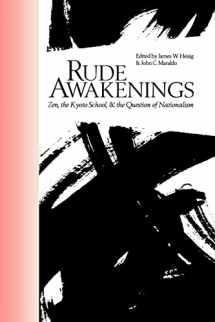
Rude Awakenings: Zen, the Kyoto School, & the Question of Nationalism (Nanzan Library of Asian Religion and Culture, 10)
Book details
Summary
Description
Can Zen tell us whether particular wars are right or wrong? What role did D. T. Suzuki and other Zen figures play in the Japanese nationalism that fueled World War II? What are we to make of nationalistic elements in the thought of Nishida Kitaro, Tanabe Hajime, Nishitani Keiji, and other philosophers of the Kyoto School? What connection was there between the Japanese project of overcoming the modernity of the West and the militarism of its 15-year war in Asia?
In a collection of carefully documented essays, 15 Japanese and Western scholars take up these and other questions about the political responsibility of Japanese Buddhist intellectuals. This well-indexed and meticulously edited volume offers a variety of critical perspectives and a wealth of information for those interested in prewar and wartime history, Zen, Japanese philosophy, and the problem of nationalism today.


We would LOVE it if you could help us and other readers by reviewing the book
Book review



